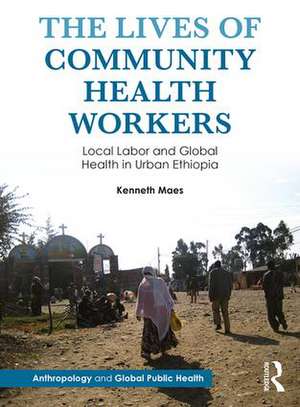The Lives of Community Health Workers: Local Labor and Global Health in Urban Ethiopia: Anthropology and Global Public Health
Autor Kenneth Maesen Limba Engleză Paperback – 13 dec 2016
Drawing on the author’s interviews with community health workers, as well as observations of their daily interactions with patients and supervisors, this volume considers what motivates them to improve the quality of life and death of the most marginalized people. The Lives of Community Health Workers also illuminates how their contributions at a micro level are intricately linked to policymaking and practice at higher levels in the field of global health. It shows us that many of the challenges that community health workers face in their daily lives are embedded in larger social, economic, and political contexts, and it raises a resounding call for further research into their labour and health systems they inhabit.
| Toate formatele și edițiile | Preț | Express |
|---|---|---|
| Paperback (1) | 389.38 lei 6-8 săpt. | |
| Taylor & Francis – 13 dec 2016 | 389.38 lei 6-8 săpt. | |
| Hardback (1) | 997.90 lei 6-8 săpt. | |
| Taylor & Francis – 23 dec 2016 | 997.90 lei 6-8 săpt. |
Preț: 389.38 lei
Nou
Puncte Express: 584
Preț estimativ în valută:
74.51€ • 77.29$ • 62.13£
74.51€ • 77.29$ • 62.13£
Carte tipărită la comandă
Livrare economică 27 martie-10 aprilie
Preluare comenzi: 021 569.72.76
Specificații
ISBN-13: 9781611323610
ISBN-10: 1611323614
Pagini: 188
Dimensiuni: 152 x 229 x 8 mm
Greutate: 0.45 kg
Ediția:1
Editura: Taylor & Francis
Colecția Routledge
Seria Anthropology and Global Public Health
Locul publicării:Oxford, United Kingdom
ISBN-10: 1611323614
Pagini: 188
Dimensiuni: 152 x 229 x 8 mm
Greutate: 0.45 kg
Ediția:1
Editura: Taylor & Francis
Colecția Routledge
Seria Anthropology and Global Public Health
Locul publicării:Oxford, United Kingdom
Cuprins
Introduction
1. The problems facing community health workers at the turn of Ethiopia’s alicha millennium
2. Becoming a community health worker: a biosocial and historical perspective
3. Some assembly required: community health worker recruitment and basic training
4. To care and to suffer: community health work amid unemployment and food insecurity
5. Where there is no labor movement
Conclusion: recommendations for action and research
1. The problems facing community health workers at the turn of Ethiopia’s alicha millennium
2. Becoming a community health worker: a biosocial and historical perspective
3. Some assembly required: community health worker recruitment and basic training
4. To care and to suffer: community health work amid unemployment and food insecurity
5. Where there is no labor movement
Conclusion: recommendations for action and research
Recenzii
'Both for those who are knowledgeable about community health worker issues as well as for those with a broad interest in global health, this is an important book that brings a social science and anthropological perspective to two of the important issues of our time.'
Henry B. Perry Johns Hopkins Bloomberg School of Public Health, Bulletin of the History of Medicine, Volume 92, 2018
Henry B. Perry Johns Hopkins Bloomberg School of Public Health, Bulletin of the History of Medicine, Volume 92, 2018
Descriere
Based on ethnographic work with a group of Ethiopian women and men who provide home-based care in Addis Ababa during the early roll-out of antiretroviral therapies, this book illustrates what it actually means to become a community health worker in today's global health industry, and considers what motives them to improve the quality of life and death of the most marginalized people in their own communities. It shows us that many of the challenges that community health workers face in their daily lives are embedded in broader social, economic, and political contexts, and it raises a resounding call for further research into their labour, and the health and social systems they inhabit.





